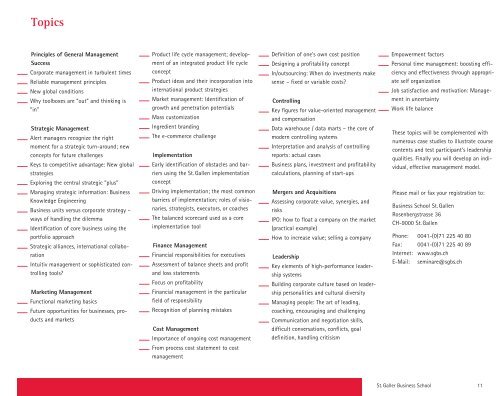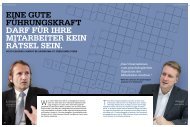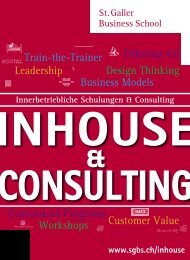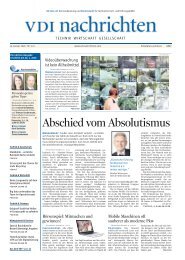2018 Management Seminars in English, St. Gallen International Business School
The seminar program of the Business School St. Gallen is based on the “St. Gallen Concept of an Integrated Management”. Today, this St. Gallen Management-Concept is standard within modern management training and development. The Concept of Integrated Management provides a mental map and steering aid which meet the needs of today’s very complex and global challenges. But the St. Gallen Approach advanced by Professor Knut Bleicher intentionally isn’t a recipe or a nostrum. In fact it offers a perfect framework – a “framework for meaning” (Ulrich) – which helps managers to identify and solve problems by themselves. Therefore the experienced manager gets via integrated process concepts essential thoughtprovoking impulses and instruments that enable him applying the holistic St. Gallen body of thought within the own company. As a consequence answers and basic concepts in order to deal with permanent change emerge. The St. Gallen Concept by Professor Bleicher has been recently published in the 9th edition (2017) and has accomplished a constant place in management literature. Although at the moment the enhancements of the St. Gallen Model focus on ethical aspects in the sense of Corporate Citizenship and process-optimizing, the Integrated Management Concept of Knut Bleicher remains the central pillar of the St. Gallen understanding of management. Moreover this integrated approach marks an explicit opposite pole to unidimensional management thinking especially widely spread among anglamerican areas.
The seminar program of the Business School St. Gallen is based on the “St. Gallen Concept of an Integrated Management”. Today, this St. Gallen Management-Concept is standard within modern management training and development.
The Concept of Integrated Management provides a mental map and steering aid which meet the needs of today’s very complex and global challenges. But the St. Gallen Approach advanced by Professor Knut Bleicher intentionally isn’t a recipe or a nostrum. In fact it offers a perfect framework – a “framework for meaning” (Ulrich) – which helps managers to identify and solve problems by themselves. Therefore the experienced manager gets via integrated process concepts essential thoughtprovoking impulses and instruments that enable him applying the holistic St. Gallen body of thought within the own company. As a consequence answers and basic concepts in order to deal with permanent change emerge.
The St. Gallen Concept by Professor Bleicher has been recently published in the 9th edition (2017) and has accomplished a constant place in management literature. Although at the moment the enhancements of the St. Gallen Model focus on ethical aspects in the sense of Corporate Citizenship and process-optimizing, the Integrated Management Concept of Knut Bleicher remains the central pillar of the St. Gallen understanding of management. Moreover this integrated approach marks an explicit opposite pole to unidimensional management thinking especially widely spread among anglamerican areas.
Create successful ePaper yourself
Turn your PDF publications into a flip-book with our unique Google optimized e-Paper software.
Topics<br />
Pr<strong>in</strong>ciples of General <strong>Management</strong><br />
Success<br />
Corporate management <strong>in</strong> turbulent times<br />
Reliable management pr<strong>in</strong>ciples<br />
New global conditions<br />
Why toolboxes are “out” and th<strong>in</strong>k<strong>in</strong>g is<br />
“<strong>in</strong>”<br />
<strong>St</strong>rategic <strong>Management</strong><br />
Alert managers recognize the right<br />
moment for a strategic turn-around; new<br />
concepts for future challenges<br />
Keys to competitive advantage: New global<br />
strategies<br />
Explor<strong>in</strong>g the central strategic “plus”<br />
Manag<strong>in</strong>g strategic <strong>in</strong>formation: Bus<strong>in</strong>ess<br />
Knowledge Eng<strong>in</strong>eer<strong>in</strong>g<br />
Bus<strong>in</strong>ess units versus corporate strategy –<br />
ways of handl<strong>in</strong>g the dilemma<br />
Identification of core bus<strong>in</strong>ess us<strong>in</strong>g the<br />
portfolio approach<br />
<strong>St</strong>rategic alliances, <strong>in</strong>ternational collaboration<br />
Intuitiv management or sophisticated controll<strong>in</strong>g<br />
tools?<br />
Market<strong>in</strong>g <strong>Management</strong><br />
Functional market<strong>in</strong>g basics<br />
Future opportunities for bus<strong>in</strong>esses, products<br />
and markets<br />
Product life cycle management; development<br />
of an <strong>in</strong>tegrated product life cycle<br />
concept<br />
Product ideas and their <strong>in</strong>corporation <strong>in</strong>to<br />
<strong>in</strong>ternational product strategies<br />
Market management: Identification of<br />
growth and penetration potentials<br />
Mass customization<br />
Ingredient brand<strong>in</strong>g<br />
The e-commerce challenge<br />
Implementation<br />
Early identification of obstacles and barriers<br />
us<strong>in</strong>g the <strong>St</strong>. <strong>Gallen</strong> implementation<br />
concept<br />
Driv<strong>in</strong>g implementation; the most common<br />
barriers of implementation; roles of visionaries,<br />
strategists, executors, or coaches<br />
The balanced scorecard used as a core<br />
implementation tool<br />
F<strong>in</strong>ance <strong>Management</strong><br />
F<strong>in</strong>ancial responsibilities for executives<br />
Assessment of balance sheets and profit<br />
and loss statements<br />
Focus on profitability<br />
F<strong>in</strong>ancial management <strong>in</strong> the particular<br />
field of responsibility<br />
Recognition of plann<strong>in</strong>g mistakes<br />
Cost <strong>Management</strong><br />
Importance of ongo<strong>in</strong>g cost management<br />
From process cost statement to cost<br />
management<br />
Def<strong>in</strong>ition of one's own cost position<br />
Design<strong>in</strong>g a profitability concept<br />
In/outsourc<strong>in</strong>g: When do <strong>in</strong>vestments make<br />
sense – fixed or variable costs?<br />
Controll<strong>in</strong>g<br />
Key figures for value-oriented management<br />
and compensation<br />
Data warehouse / data marts – the core of<br />
modern controll<strong>in</strong>g systems<br />
Interpretation and analysis of controll<strong>in</strong>g<br />
reports: actual cases<br />
Bus<strong>in</strong>ess plans, <strong>in</strong>vestment and profit ability<br />
calculations, plann<strong>in</strong>g of start-ups<br />
Mergers and Acquisitions<br />
Assess<strong>in</strong>g corporate value, synergies, and<br />
risks<br />
IPO: how to float a company on the market<br />
(practical example)<br />
How to <strong>in</strong>crease value; sell<strong>in</strong>g a company<br />
Leadership<br />
Key elements of high-performance leadership<br />
systems<br />
Build<strong>in</strong>g corporate culture based on leadership<br />
personalities and cultural diversity<br />
Manag<strong>in</strong>g people: The art of lead<strong>in</strong>g,<br />
coach <strong>in</strong>g, encourag<strong>in</strong>g and challeng<strong>in</strong>g<br />
Communication and negotiation skills,<br />
difficult conversations, conflicts, goal<br />
def<strong>in</strong>ition, handl<strong>in</strong>g critisism<br />
Empowerment factors<br />
Personal time management: boost<strong>in</strong>g efficiency<br />
and effectiveness through appropriate<br />
self organization<br />
Job satisfaction and motivation: <strong>Management</strong><br />
<strong>in</strong> uncerta<strong>in</strong>ty<br />
Work life balance<br />
These topics will be complemented with<br />
numerous case studies to illustrate course<br />
contents and test participant’s leadership<br />
qualities. F<strong>in</strong>ally you will develop an <strong>in</strong>dividual,<br />
effective management model.<br />
Please mail or fax your registration to:<br />
Bus<strong>in</strong>ess <strong>School</strong> <strong>St</strong>. <strong>Gallen</strong><br />
Rosenbergstrasse 36<br />
CH-9000 <strong>St</strong>. <strong>Gallen</strong><br />
Phone: 0041-(0)71 225 40 80<br />
Fax: 0041-(0)71 225 40 89<br />
Internet: www.sgbs.ch<br />
E-Mail: sem<strong>in</strong>are@sgbs.ch<br />
<strong>St</strong>. Galler Bus<strong>in</strong>ess <strong>School</strong> 11

















